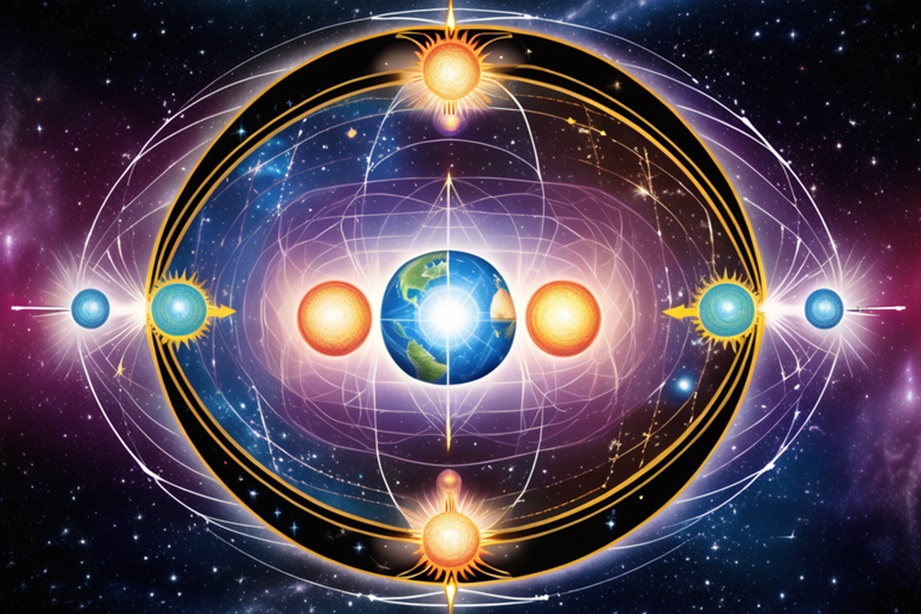We degrade ourselves with our own belief structures. The moment we start grasping at something and saying to ourselves ‘that this is this and that is the other’ we have (unbeknownst to ourselves) started the decay process, the degradation process. This is the sword of discrimination that Jung talks about, this is how we divide the world up into parcels. When we do divide the world up into parcels with the sword of the discriminatory intellect this is all coming from us, not from anywhere else, not from reality itself. This is our own special brand of order that we are imposing and the crucial point is that we are imposing it. We are ‘the imposes of artificial order’. The structuration of reality is all our own doing and it is therefore always ‘artificial’.
When we (or when the discriminative intellect) says ‘this is this and that is the other’ this simply isn’t true. Everything there is has only the one character and this is the character of characterlessness. Or as we could also say, everything there is has only the one feature and that is the feature of featurelessness. Characterlessness (or featurelessness) sounds very grey, very blank to us but that isn’t the case; it is just our prejudice to imagine that featurelessness must be a blank or colourless sort of thing. Something that is branded with the one style of characterization, the only style of formatting has only that one style and this is in itself not as all interesting when we actually look at it. This is ‘the desert of regularity’, to misquote Baudrillard. Something that is featureless, on the other hand, has all features contained within it, and this is endlessly interesting. By saying nothing we say everything.
Instead of saying that something that is featureless has all features in it, or that something as no shape or form contains all shapes, or forms, we could say that everything there is but has one nature and that is the nature of suchness. Everything that exists possesses suchness (or non-comparative meaning) – everything that exists partakes in the absolute mystery of existence could – this could hardly be otherwise, after all. But when we say the word ‘mystery’ this tends to indicate that what we’re talking about is some kind of dry intellectual puzzle, and whilst existence can of course be treated as an intellectual puzzle it goes a lot deeper than this. Normally when we want to describe something we say that it is ‘like something else’ and this gives us some sort of clue but the whole point about suchness (or non-comparative meaning) is that it’s not like anything. If everything that exists possesses suchness and if this suchness pertains to ultimate being itself (or whatever other term we might want to use) then clearly it can’t be compared to anything else. What else can ultimate being be compared with?
Instead of suchness we could (as we have said) talk about non-comparative or non-referential meaning. When we try to say that something means X or that something means Y we ordinarily point to something that is extraneous to the object in question; we refer to an external framework and we use this framework to say things about the phenomenon under consideration. This can only ever be a trivial type of meaning however since when we get down to the nitty-gritty and try to talk about being itself we have to dispense with any notion that there is any such thing as ‘an external or extraneous framework’. There is no source of meaning on the outside of reality – how could there be, after all? There is no ‘outside’, what lies outside reality is unreality, what lies outside the truth is of necessity a lie. There is a source of meaning, we might say, but there is nothing outside that source that may give us ‘an overview’, so to speak. And yet it’s not that we aren’t able to get on it any perspective on what’s going on – rather, is that there is nothing else here but perspective. We have ‘endless perspective’ but nothing to get perspective on.
This sounds rather hollow, rather disappointing, but this isn’t at all the case – were we to have a situation where there is an unquestionable ‘object’ of some sort and where we can obtain perspective on this so-called ‘object’ this would seem to us like the right way around to have things but it isn’t. If we have things this way around then the object trump’s any perspective that we might bring to bear on it and the thing about this is that if the object trumps the perspective then what this means is that the ‘perspective’ in question isn’t really perspective at all. It’s tame perspective, sham perspective, perspective that is subservient to some brand of so-called ‘objective reality’. Instead of perspective we have what comes down to an obedient ‘YES man’. Perspective can’t play second fiddle to some supposed ‘object’ without ceasing to be perspective; it frankly isn’t worth a damn if it can’t trump whatever it is that it is being brought to bear on. Perspective is the ‘acid bath of the alchemists’ and there’s nothing that it will not dissolve. We would like very much to imagine that there are certain things, certain elements, certain beliefs, certain points of dogma etc, that it can’t dissolve but that’s only our fear speaking – our fear of actual, ungrounded reality. We fear groundlessness and so we fear perspective, because that is the truth that perspective always shows us. Perspective always shows us the truth of groundlessness – there’s nothing else it can show us.
There’s nothing to get perspective on because perspective undoes all our mental objects, all of our reifications. It is our reifications that motivate us one way or the other and provide us therefore with our ‘meaning-maps’ for the world; It is these meaning maps that give us our overview on life and allow us to purposefully navigate through it in the way that we do dash this is what produces the external or extraneous framework that we have just been talking about. The lack of perspective – which we prize without knowing that we do so, since we don’t have the perspective necessary to see that this is what we’re doing – facilitates what we might call the System of Extrinsic Meaning and this system of EM has no ‘suchness’ in it. This system is what rules our life. Suchness is also sometimes called in Buddhist metaphysics ‘self-so nature’ and no reified object can have self-so nature. No reified object can have self-so nature because no reified object exists ‘of itself’. If reified objects don’t exist of themselves then they can’t have any self-so nature – they don’t partake in the ‘mystery of existence’ (if we can use that somewhat hackneyed phrase) and so they have no mystery. They are only what we say they are, what we judge them to be, what we intended from the very onset for them to be. ‘The meaning that traps us’ (the system of EM that effectively operates us, in other words) is meaning that we ourselves have assigned in another words, and for this reason it is hollow meaning, false meaning, deceptive meaning. It is meaning that is (when it comes down to it) nothing more than disguised meaninglessness. Instead of saying that we degrade ourselves with our belief structures we could equally well say that ‘we degrade ourselves by subscribing to the System of Extrinsic Meaning’. How could this not be a process of degradation when the System of Extrinsic Meaning is actually disguised meaninglessness? The SOEM defines or determines our reality for us and it also defines or determines what we want and what we don’t want – extrinsic meaning translates into extrinsic motivation therefore. What we take to be true, what we take to be important, is what determines our thoughts and our actions (i.e. what we want to avoid and what we want to aim at) and so if our map of what seems meaningful to us is made up of this thing that we have called ‘disguised meaninglessness’ (and which we could also call ‘camouflaged redundancy’) then the genuine meaning of our lives is transformed into what can only be described as a parody or caricature of what it would otherwise be.
The degradation in question is therefore not simply the regular type of deterioration that we are so familiar with but the transformation of the original state of affairs (which we cannot actually say anything about) into a parody of that situation, a gross caricature of that original state of affairs (and a which we can talk about). What we are looking at here is an inversion in other words – everything has been turned on its head. We like having a description of the world that is final, that is unquestionable and therefore absolutely reliable; to have to cope without this seems like an utterly horrific proposition – it’s actually too frightening for us to contemplate. In effect, we would rather have a parody of reality that we can describe to ourselves than the genuine (non-parodic) article that cannot in any way be described, even though nothing that happens in this parody is real.
Image – wallpaperbetter.com






